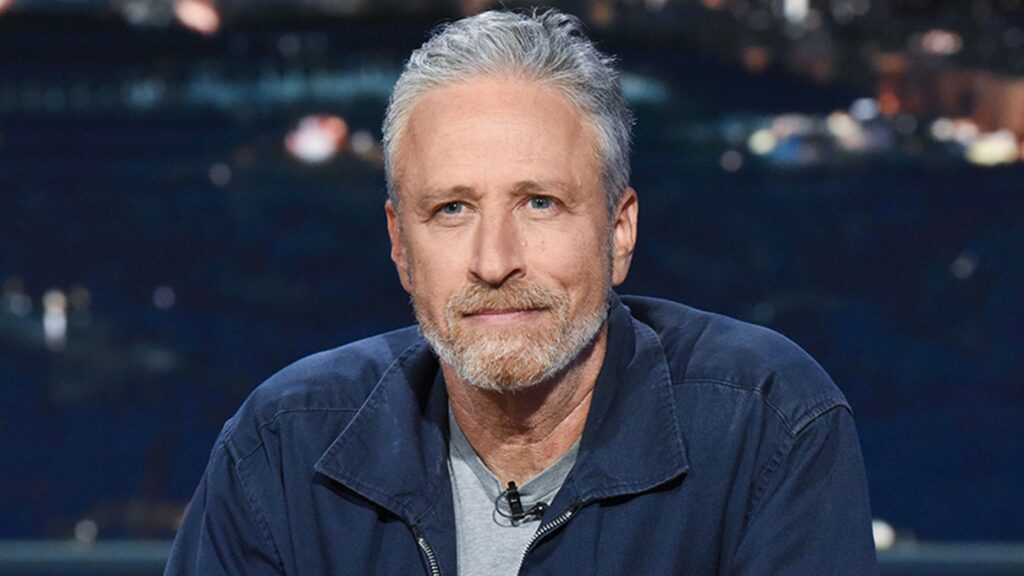Who Decides What’s Disinformation?
What if the "fake news" is really fake news?

Via memeorandum, I have stumbled upon Fox News favorably quoting Jon Stewart in support of Joe Rogan’s promotion of anti-vax conspiracy theories. Like Steven Taylor, I have no interest in going All Rogan All the Time. Indeed, the interesting part isn’t really about Rogan at all.
On Thursday’s installment of his AppleTV+ program “The Problem With Jon Stewart,” Stewart began by acknowledging he’s “guilty of a bias” since he “knows” Rogan and by default would “grant more understanding and nuance to people you know.”
He then referenced the “weapons of mass destruction” reports in the media in the lead-up to the Iraq War.
“The New York Times,right, was a giant purveyor of misinformation, and disinformation. I don’t know if the Times was purposeful, but misinformation,” Stewart said. “And that’s as vaunted a media organization as you can find, but there was no accountability for them.”
“And I think where I get nervous is in the run-up to the Iraq War and in the prosecution of the Iraq War, I was very vocal … about that. But the mainstream view, the New York Times, was, ‘They have weapons of mass destruction, they have these tubes that can only be used for nuclear war, Saddam Hussein is this, he’s that,'” Stewart said, saying he wasn’t censored by Viacom, Comedy Central’s parent company.
The former “Daily Show” host pointed out neither he nor anyone else is “owed” a platform so it didn’t amount to a First Amendment issue, but warned “these are shifting sands.”
“I think I get concerned with who gets to decide what … In the Iraq War, I was on the side of what you would think on the mainstream is misinformation. I was promoting what they would call misinformation,” Stewart said. “But it turned out to be right years later and the establishment media was wrong. And not only were they wrong, in some respects, you could make the case that they enabled a war that killed hundreds and hundreds of thousands of people and never paid a price for it and never had accountability. And just having an ombudsman print a retraction to me isn’t accountability.”
“So it’s very easy to attack Rogan … and I’m not saying that that’s not your right and that there aren’t things there to talk about, but what I’m saying is let’s be careful because the sands can shift,” Stewart added.
Like Stewart, my instincts on speech are maximalist. We should by and large give people a wide berth to express their views and let debate flourish.
But, first off, nobody is stopping Rogan from saying what he wants. Indeed, he’s got a massive platform and is being paid handsomely for sharing his ideas. It’s just that other people find what he’s saying loathsome (in the case of his anti-gay and -trans language) or dangerous (in case of his COVID views) and don’t want to be associated with him by virtue of being hosted on the platform that’s paying to spread his messaging.
Second, I’m skeptical that Stewart’s 2003 views on the Iraq war and Rogan’s current views on COVID are comparable. There were plenty of politicians and foreign policy analysts expressing similar reservations about the invasion of Iraq and the war on terror at the time; it was simply that the zeitgeist was very pro blowing things up in the Middle East. Is it conceivable that, 20 years from now, we’ll look back and kick ourselves for vaccinating young people and not using horse tranquilizers to wipe out COVID? Not likely. Most of what Rogan is pushing is simply nonsense.
But, again, I’m leery of the broader culture that has politicized these debates. While I’m on Team Vaccines, I at least understand why people are skeptical of getting their young children, who have an extremely low likelihood of having effects from COVID, jabbed. While I’m befuddled why someone outraged that the government is forcing us to take part in “a giant medical experiment” by getting vaccinated would be enthusiastic about experimenting on themselves with off-label use of other drugs, I guess they have a right to cognitive dissonance.
Beyond COVID, which got politicized from the outset by a President who thought it was very unfair that a virus from China was hurting his re-election chances and was thus weird from the beginning, there seems to be an increasingly-wide array of issues where debate simply isn’t allowed. The major social media platforms, Twitter and Facebook, are quick to label things as “disinformation” or “misleading” and to suspend or ban accounts posting those ideas. While, like Spotify, they’re private entities and not implicated in the First Amendment for censoring content, there’s something rather creepy about corporations—or computer algorithms—deciding which viewpoints may be shared.





There is no comparison between a news source that tries to get things right and makes an occasional mistake, and a news source who will “report” whatever advances their agenda or, even worse, whatever generates the most reaction.
Stewart is long past his ‘best by’ date.
In the end contrarians always end up on the right.
The NYT’s coverage of Iraq was based upon the actions of the American government. They didn’t force the Iraq invasion. They justified it to people who wanted elite justification, but they didn’t take a few minor-league cranks and amplify them. The US Government was the crank. Rogan has done the opposite. The medical establishment is not on his side. It’s weird guys with bad everything who think COVID is a plot by the government. There’s just no comparison here.
Jon Stewart disappeared when we needed him, reappeared when it was too late, and is now desperate to find an angle to make himself relevant when he really has nothing interesting to add.
I became politically aware during Vietnam. The government lies. Also, bureaucracies lie and corporations lie. And the supposedly liberal MSM lazily transmit, and sometimes amplify, lies. And water is wet.
Yes, no one wants bad, and dangerous, information out there. But who is to decide? The MSM has decided to sometimes stop, or add corrections to, bad info. But so far only on the two clear cut cases of COVID and the 2020 election.
But why do we have this problem? It’s fair to point out examples, as here with the drumbeat for Iraq, but has it ever been this bad? In the late 1850s the southern Democratic press didn’t claim slavery didn’t exist, or was an abolitionist false flag. In Vietnam the GOPs didn’t reflexively attack everything Johnson did, or Dems everything Nixon did. Dems, to their shame and Hillary’s later embarrassment, voted for the AUMF in Iraq. It’s only in the last few decades that we’ve seen a major party become utterly indifferent to the truth.
I read this piece last night and really do think that he is making a false equivalence. There is a profound difference between being wrong and talking to cranks/being unwilling or unable to understand what fringe information is or is not.
@Barry: @Michael Reynolds: I don’t know what to make of Stewart at the moment. There was an appearance on Colbert right before his new Apple TV show premiered that made me wonder: is he joking, or is he flirting with some conspiracy nonsense? (it was about whether covid was manufactured in a lab or not). It wasn’t me, my wife commented on it at the time without me bringing it up.
We watched the first episode of his new show and it struck me as a long, somewhat amateurish, 60 Minutes segment, but with cursing. I have had no interest in watching more.
One thing is for sure: he did not pull off the “let’s use comedy to talk about a serious thing for a protracted segment” the way John Oliver does.
BTW: yes, the MSM helped prime the country for war, and I will admit that at the time, I supported the invasion. It was a catastrophic disaster, and yes, the media should have been more skeptical.
In terms of moral and intellectual failings, the NYT, CNN, et al., were more consequentially wrong than Rogan.
Having said all of that: it wasn’t like CNN had astrologers on to predict Saddam’s downfall or people who claim to have intel from Mars as a reason to go to war. There were a lot of people who were wrong about WMD, democracy promotion, and terrorism as it pertained to Iraq and while a lot of people (myself included) should have known better (I was ultimately convicted by Colin Powell, to my regret–and the fact that I thought surely we would have a plan for what to do once the regime fell–welp, turns out not so much), the zeitgeist was not informed by tarot card readers and the like.
(And I am sure that in retrospect one could argue that they were all just as competent as the local medium, but hindsight and all that).
To be clear, I am not making excuses, but the point is that it is obvious NOW that listening to Dr. Ivermectin is a bad idea–not something that will be revealed to have been bad info 20 years from now.
Jon Stewart has not aged well, and is ironically one of the sources of two trends that helped create the mess we’re in now:
1. The “I’m serious, until I get backlash, in which case it was just a joke” Shroedinger’s douchebag approach to punditry
2. They’re all crooks so there’s no point taking sides style political nihilism
@Stormy Dragon:
It’s also become obvious that Stewart was getting the credit that really should have gone to the Daily Show writers, and he by himself lacks something without Wilmore, Black, Colbert, Oliver, Bee, etc. nearby
The Wyatt Cynak accusations also didn’t help
Our adversaries have figured out that the weak point of a democracy is the people — a lot of this speech is literally a disinformation campaign to keep America weak and divided.
That sounds like a crazy conspiracy theory, but Twitter and Facebook are regularly disabling foreign based accounts spreading lies targeted at Americans. They’re putting the stuff out there that is found by Americans “doing their own research”.
My expectation is that they are exploiting American-grown nonsense, and just trying to amplify it, but when you see just how simultaneously pro-Russian and pro-Bullshit Fox has become, I would not be shocked to find that the network was being fed misinformation and were useful idiots or worse.
I don’t know what the right answer is, but free speech maximalism is failing us. Between the Antivaxxer Ivermectin crowd, the 2020 Election Fraud Lies, and Q Anon, a large portion of America doesn’t live in reality anymore.
@Barry: Indeed, it does seem that the contrarians end up on the right. I suspect that it’s because the right has become the only force willing to be contrarian on whatever subject comes up.
[…]
Would Mr. Stewart be willing to suggest what he thinks would be accountability? (I used to tell my students that it isn’t enough to identify something as deficient; most of the time, you also have to explain what is sufficient.)
@Steven L. Taylor: I suspect the only lessons in this are that even intelligent people are vulnerable to confirmation bias…and Jon Stewart depended more on his writing and research staff at Comedy Central than we had imagined.
We are all vulnerable. It’s a never-ending battle and anyone who thinks they aren’t has lost it.
@Steven L. Taylor:
I was one who was against the invasion of Afghanistan, even though I lost a cousin on 9/11 in tower 1. I was called anti-American and worse by many who should have known better.
I take no pleasure in having been right.
@Stormy Dragon:
I agree. It’s generally acknowledged that the show dramatically improved after he took over from Craig Kilborn–though I can’t personally attest to that, as I’ve never seen any of the Kilborn episodes. Perhaps Stewart gets more credit than he deserves for being singlehandedly responsible for the transformation.
I did notice for quite a while that Stewart was never particularly strong as an ordinary pundit, and had a tendency to fall into vague bothsiderism. Despite the show’s obvious slant, I couldn’t have confidently told you what Stewart’s positions were on specific issues. Much of the show’s focus when he hosted it was critique of the media–Fox specifically for being right-wing propaganda, but also the mainstream media for laziness, superficialty, and sensationalism. It did a good job in that critique.
Lol wut? What are these issues and who are these accounts that are allegedly disallowed and being quickly banned? Because I see all sorts of bigotry, hate, misinformation, and disinformation being spread everywhere online and across social media without consequence.
I’d like the speak to the manager of whomever thinks they’re quickly banning and suspending stuff, they are doing a fantastically subpar job.
“So it’s very easy to attack Rogan … and I’m not saying that that’s not your right and that there aren’t things there to talk about, but what I’m saying is let’s be careful because the sands can shift.”
What is Jon Stewart even talking about here? I don’t think even he knows.
As he says, people have the right to critique Joe Rogan’s broscience nonsense. Artists have the right to disassociate from Rogan’s corporate parent if they want. So. What’s the big deal?
Sorry a multimillionaire is upset about another multimillionaire friend being criticized, but sure there’s more serious issues. Time to move on from this genre of cranky Xer-comedians-whining because their 2006 heydey is gone and they can’t adjust to change.
I think it’s possible that Rogan may have simply stumbled into a situation where he matches a pattern that many have observed about people who are “just asking questions” in manifest bad faith. I think it’s possible that Rogan is acting in good faith, but this gives cover to people who do very similar things, but with the intention of recruitment for purposes of radicalization and anti-democracy.
And yeah, the latter sounds a bit like a wild-eyed conspiracy, except that it has documentation. But how is documentation different than a live Google search for some web page that backs you up? This rabbit hole goes a long way.
Our epistemology is being radically reshaped by the internet. Those of us who care need to develop new strategies. Citing “published research” may work with other academics, but it works less and less with the public.
@Gustopher: You’ve been doing some homework. Good for you.
You’ll find the frustrating part of understanding how this game is unfolding…is that the majority of people who cannot apprehend what is happening will trot out the “no one could have foreseen…” card when more serious and painful remedies have to be taken to get things back under control.
“Now we reach our modern age, where we can no longer endure our vices, or the remedies needed to cure them.” -Livy circa 20 BC.
In other news: Investigator Durham shows that the entire Russia-Trump “expose” was a Hillary campaign plant engineered with government bureaucrats helping, and major news sources going along with the scam. Democrats are such effing liars and traitors.
I’m really of two minds on this subject, but it’s really hard for me to figure out a way to say it succinctly.
In an attempt to avoid a wall o’ text:
Speech restrictions are almost always hijacked to use against marginal groups (even those designed to protect those very marginal groups), especially those on the left.
However, without speech restrictions, forums and platforms are targets for hijacking by trolls, bad-faith actors and spam. Each of the right wing twitter and facebook clones that hyped the lack of moderation has had to battle this problem with varying lack of success. And the same thing can happen with platforms that have heavy hitters like Rogan.
But how to create gatekeepers that filter out the bad faith actors and allow speech, even speech that challenges us or that we might not like but are at least made in good faith, through?
I don’t know if there really is an answer, at least one that would be acceptable to most of us, but those are the tensions I see in this problem.
@John430: Durham Distances Himself From Furor in Right-Wing Media Over Filing